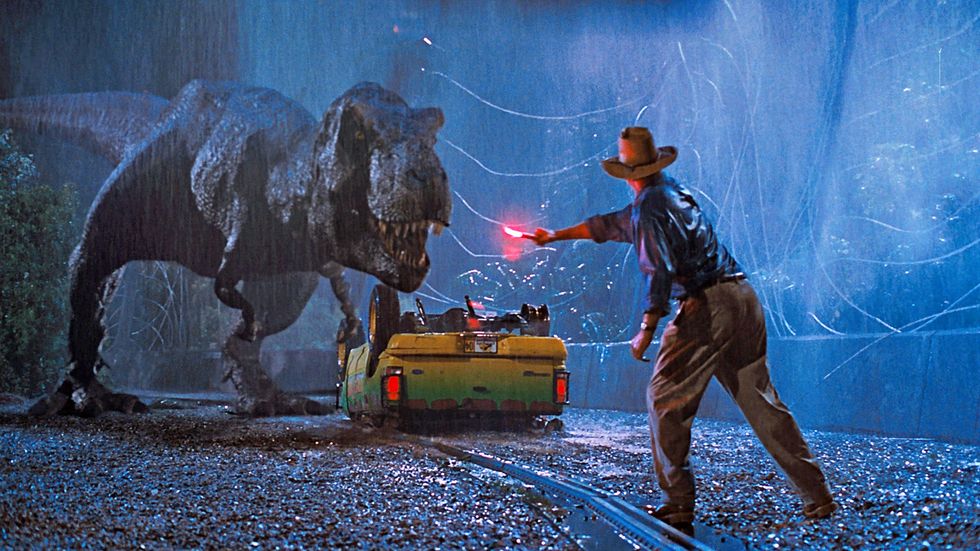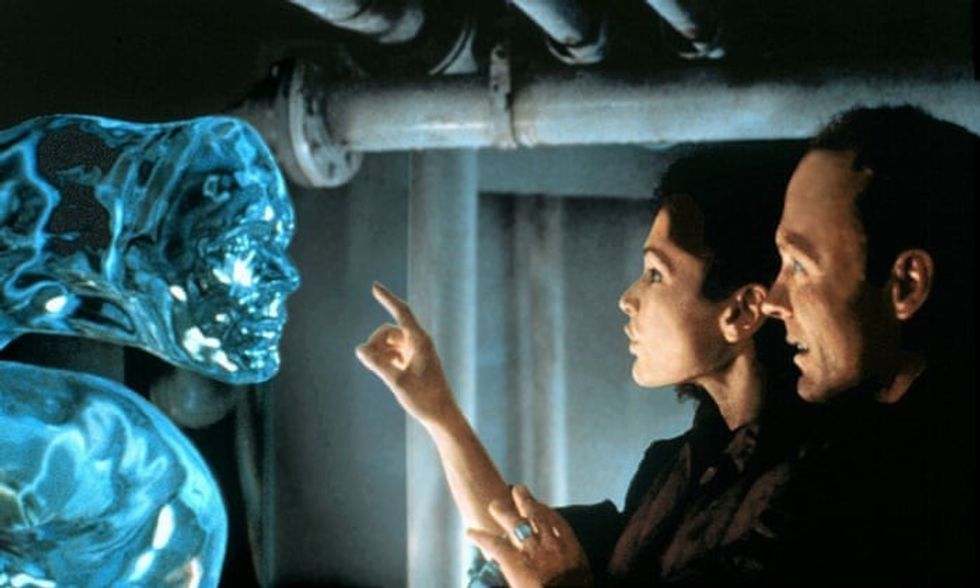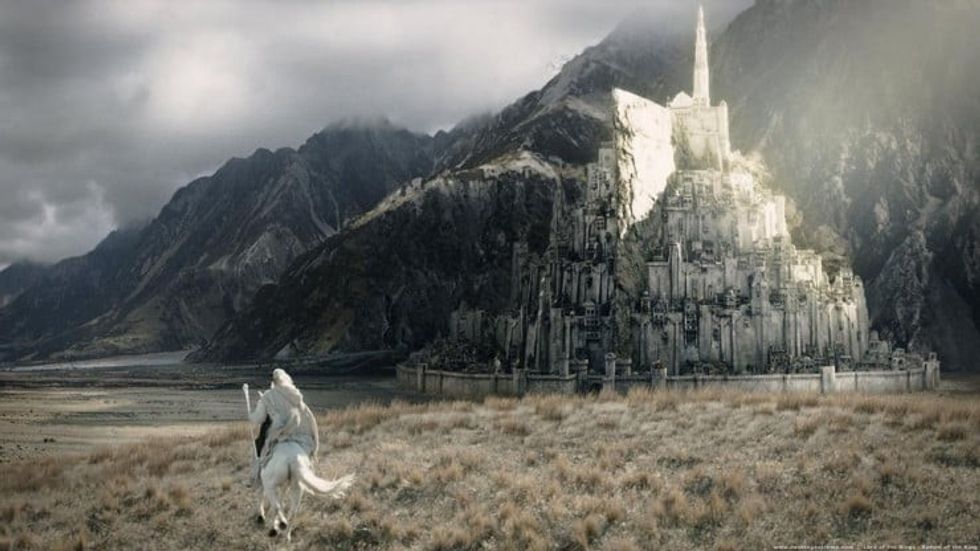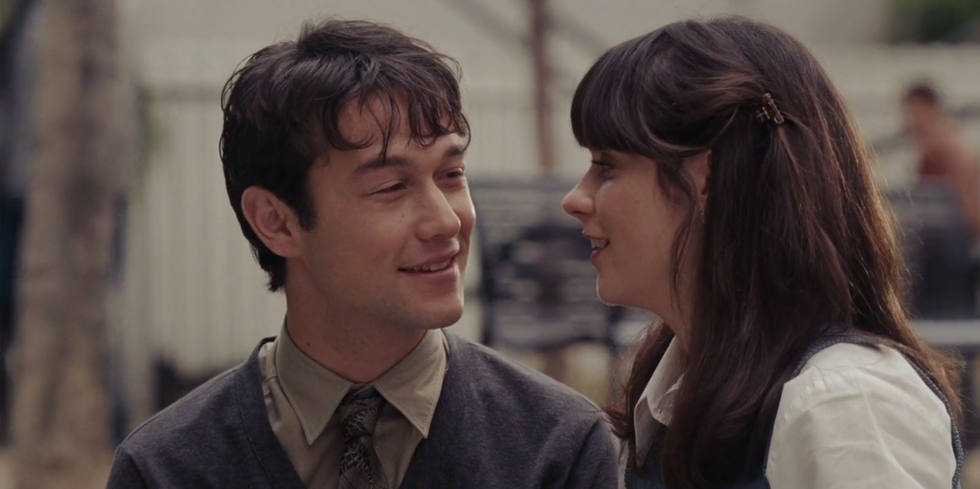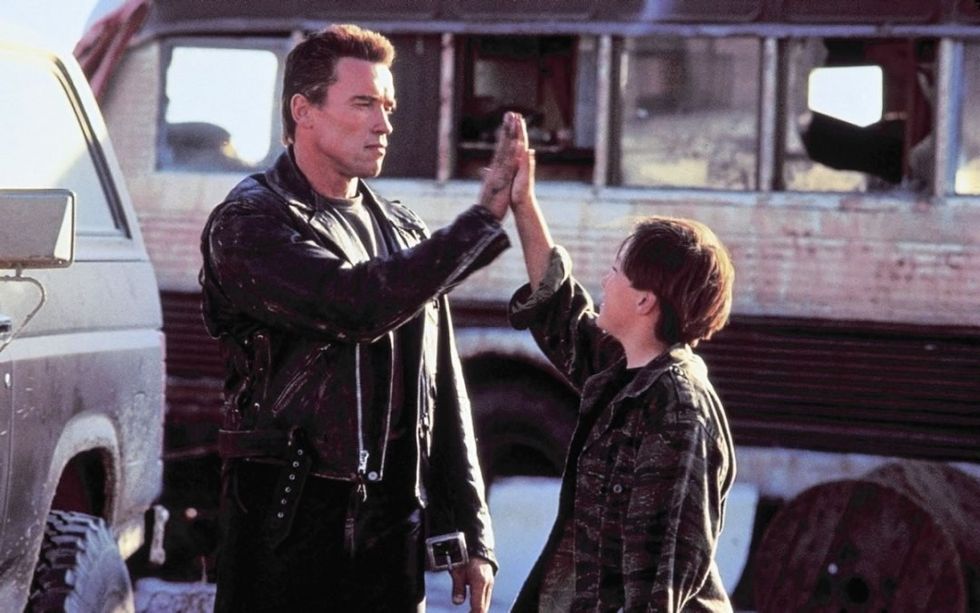How Jennifer Kent Brought the Brutal Horror of 'The Nightingale' to Life
Jennifer Kent's "The Nightingale" is a brutal, unforgiving reckoning with Australia's colonial past.
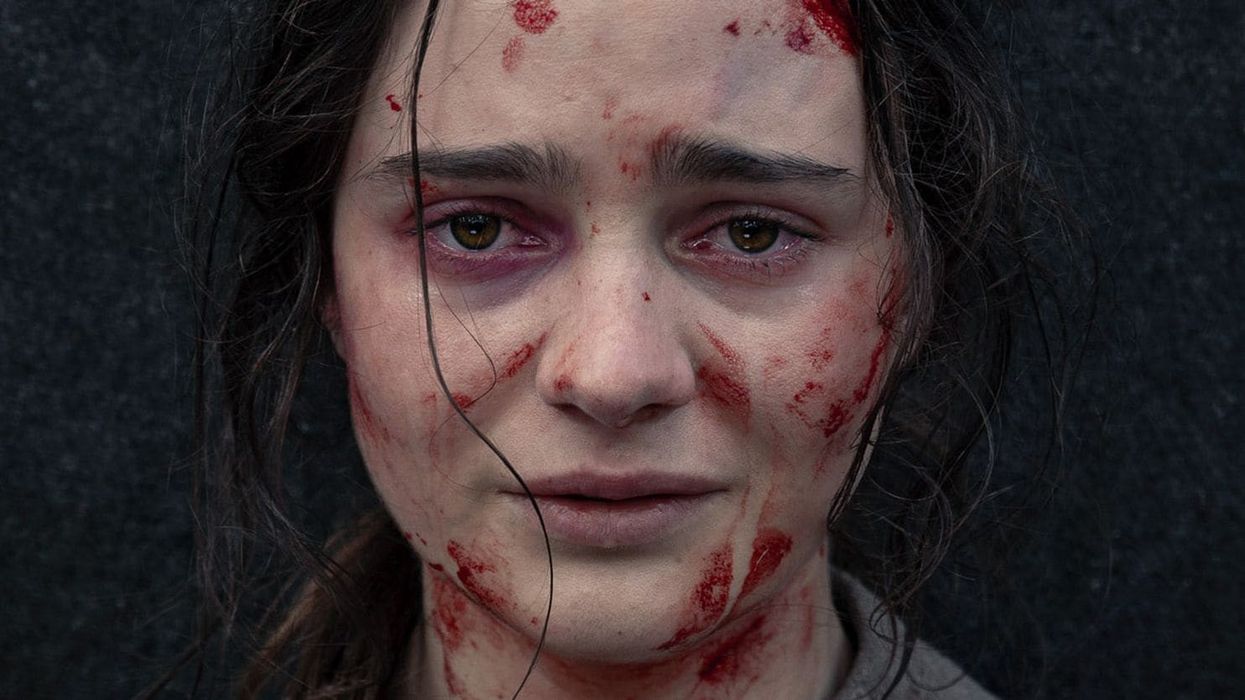
The history of colonization is bloody, brutal, and unforgiving. Such is Jennifer Kent'sThe Nightingale. The film—Kent's follow-up to The Babadook—is an unflinching moral reckoning with Australia's past. Kent, who is Australian, has dramatized the violent British takeover of Tasmania in 1825, and the subsequent near-eradication of its indigenous population. But where another period piece might have looked for redemption or glorification of some kind, Kent is concerned with nothing but the cold, honest, harrowing truth: this slice of history was hell for both Aboriginals and the Irish prisoners who have been transported to the island for hard labor.
At the center of it all is Clare (Aisling Franciosi), an Irish convict living on a small farm with her husband and newborn baby, where they are indentured servants. Their master is Lieutenant Hawkins (Sam Claflin), a ruthless man whose dictatorial tendencies often manifest in repeated sexual assaults. But when an unimaginable tragedy occurs, Clare finds herself on the run in the rugged forests of Tasmania. She happens upon an Aboriginal guide, Billy (Baykali Ganambarr), who reluctantly agrees to aid Clare on her quest for vengeance, despite her racist attitude. Ultimately, though, the outsiders find common ground in their experience of oppression.

Kent foregrounds the film in Clare's experience, framing her in claustrophobic close-ups with boxy Academy aspect ratio. It's difficult to watch the onscreen violence, but sometimes even more so to witness the brutality as reflected in Clare's face.
No Film School sat down with Kent and Ganambarr to discuss their grueling production, why Kent is committed to making smaller films, how she creates complex characters, and more.
No Film School: Jennifer, you finished Babadook, and I'm sure, in the wake of its success, a lot of people approached you wanting you to make all different kinds of films. How did you navigate that post-Babadook process, and how did you come to Nightingale?
Jennifer Kent: Well, I think I navigated the way I did pre-Babadook, which was to locate an idea I really cared about and develop it and make it. I wasn't making Babadook to go on and make blockbusters. I wasn't making that film with the desire to make a bigger and so-called "better" film. It's in my blood to make smaller films with a very personal vision.
My job as a storyteller is to serve the story, not myself.
NFS: And how did you come to The Nightingale's topic, specifically?
Kent: It started from taking a larger look at the world. I was seeing a very violent response to many global problems and I wanted to talk about how damaging that is, and how damaging it was back then, too. But it's a part of our modern world reality. What are the [alternatives] to reacting and behaving with violence? I think empathy is one of the strongest qualities that a human can possess, and so I wanted to place two people in a story and see if they could develop empathy for each other.
A story is never a linear thing. A story progresses—it develops in many surprising and abstract ways.
NFS: You take a very straightforward, unflinching approach to representing violence. What informed that decision?
Kent: I just had to look at my country's history and be informed by historical truths. Australia's history is a very difficult one, like any colonized country. And so I really needed to be true to the difficult experience of the ancestors of my country. And so, in terms of the violence, it was about looking at what happened in the era and representing it truthfully, from a compassionate standpoint. I wanted to tell it through Claire, largely, but also through Billy's eyes, because it's a shared story.
"It's in my blood to make smaller films with a very personal vision."
NFS: Billy and Claire are both very complex characters. They don't have one thing that they stand for. They're very multi-faceted. During the writing process, how did you think about their internal conflicts?
Kent: I think they had to be informed, not just by their experience, but by their time. I couldn't put a 2018 or 2019 sensibility on an 1825 character. So I needed to do the research to conceptualize who these people would've been. Admittedly, we haven't changed that much in 200 years.
But then beyond that, how would I feel in their situations? I mean, how would anyone human feel in those situations? I just mapped out the characters from there.
I knew that I wanted them to start from a greater level of ignorance. I wanted them to be provoked by their situation to connect with each other. Characters serve the story, but also it's my job to make characters real, and no human being I've ever met is one-dimensional. They all have complexities. So, as a writer, I'm very much focused on creating real characters as opposed to likable or heroic characters.

NFS: I read that production was really grueling. Can you walk me through some specific challenges that you encountered along the way, and how you tackled them?
Baykali Ganambarr: Where we were filming, in Australia and Tasmania, it was pretty wild. We were filming in so much forest and mountains. It was pretty challenging for most of us, especially the film crew because they had to carry the equipment up and down. For me, it was challenging because where I'm from in Australia, it's pretty hot. And going down to Tasmania and filming out in the cold weather was a huge challenge for me. I couldn't handle the cold, but I was really committed to the story and this film.
As a guy from a remote community in Australia, with no acting experience or acting school, getting a lead role in a feature film was pretty tough. I was so honored and blessed to have Jennifer, Sam Claflin, Aisling Franciosi, and Damon Herriman...all these experienced actors and a director supporting me and encouraging me on the journey.
"Characters serve the story, but also it's my job to make characters real, and no human being I've ever met is one-dimensional."
NFS: How did you two work together to support Baykali's lack of acting training?
Kent: The thing is, Baykali didn't have any formal training, but he's an exceptional dancer. He's a very beautiful storyteller in terms of the medium of dance. He really knew how to tell a story, and how to express emotion. He is a very sensitive person and highly creative and artistic. He does everything from his heart. And so he brought all that to me.
He also brought his Aboriginality and his culture. We had a cultural advisor who worked on the film, June Everett, a Tasmanian aboriginal elder who gave us a lot, too. But I feel like Baykali was teaching me about that culture and its story just in playing Billy.

NFS: Jennifer, can you tell me a bit about the challenges you faced as a director on this tough production?
Kent: There were a lot of challenges. Everything from the depiction of sexual violence to things I knew nothing about, like army history. It was really a matter of developing a network of people. For example, a clinical psychologist from the Rape Crisis Center in Sydney, and an Irish language expert, and an aboriginal Palawa Kani language expert. The specialists were involved from very early on, from the treatment script, pre-production, all the way through to the final cuts. I was never alone. I always had advisors. I think that's the only way with a story that's very difficult but also historically-based.
My job, as a storyteller, is to first make the film factual, and then know what it is I want to say and commit to it freely. I'm not going to lie—the shoot was terribly heartbreaking at times. I cried a lot on set and in the edits. It really deeply impacted me and broke my heart, but I felt like that commitment far outweighed my own personal sadness in taking on a project like this. I was completely dedicated.
"I cried a lot on set and in the edits. It really deeply impacted me and broke my heart."
NFS: What did you learn about depicting sexual violence from working with the psychologist?
Kent: I'm a woman, so I have my own personal experience with sexual violence. Any woman would, whether it's not being respected, or being abused, or whatever. But that's not the experience of Claire. So, of course, I needed to understand sexual trauma in a way that someone like Dr. Elaine Barrett could offer insight. But not just from the perspective of the victim, either—it was also from the perspective of the perpetrator. We looked into the psychology of both sides. And we also looked at the shared dynamic that happens with repeated abuse. Our aim was to sensitively and compassionately shine a light on the terrible damage that happens on both sides through these acts of violence.
And they are acts of violence. People have a hard time divorcing the sex from the violence when it is actually an act of violence. It's designed to annihilate a person. I really wanted to show that very honestly.

NFS: How did you think about the film aesthetically, in terms of working with the cinematographer, and building up a visual language?
Kent: Radek [Ladczuk, the DP] and I worked together on The Babadook, so we have a history. We started out with a similar goal on Nightingale, whereas with Babadook, it took time to get on the same page. Here, we both wanted to make the same film.
We went to art expeditions together, we looked at paintings together, we looked at some films. But we also gathered inspiration from nature and from the landscape itself. Tasmania is inherently gothic in its geography and topography. It was a process of letting ourselves be influenced by the locations.
"I'm very much focused on creating real characters as opposed to likable or heroic characters."
NFS: I noticed that about the visual language. You really embraced the natural elements of the landscape and brought them into the visual architecture.
Kent: Tasmania has these very tall trees and very deep forests. It felt like an interior world in The Nightingale. I wanted a landscape that reflects their believed experience. That's also how we arrived at the Academy ratio [1.375:1]—it best suited the landscape, and it also was emotionally more affecting.
These are not really intellectual decisions. It's like, you're painting a picture, and then you put red on the painting and you go, "Oh, it makes me feel happy," or, "It agitates me," or whatever you're going for. And then you say, "Oh, that's perfect." These are all emotional experiments.
NFS: You said in a previous interview that "each film tells you what it needs to be." I really like that idea, because it gets at the intuitive quality of your process. I'm wondering if you could talk more about what you meant by that.
Kent: I mean, the film is King—or Queen [laughs]. It tells you what it wants. I think that if you listen to the film and you listen to the idea, then it's not about your ego. You shouldn't be trying things because, "Oh, everyone will think it's cool," or "someone else did this in their film." It's more like, the film demands this idea and it demands this character. And you are in service of the film. Everyone's got an ego, of course, you should put the focus outside of your ego and onto the story. My job as a storyteller is to serve the story, not myself.

NFS: Are there any times when you come into tension with what you think the story wants and what you might want for it?
Kent: There's confusion at times. Of course, I'm human and feel doubt. I feel like, "Well, was that the right choice?" And even sometimes in the edit, I'm thinking, "Oh, did I shoot this thing the right way?" But I try to really hone that central idea and know what it is in my soul, and then it helps to make me firmer in my decisions. And then your beautiful cast and crew come in and they give you something much more than what you've conceived on your own, and that's the gift of collaboration.
NFS: Was there an example of a time when one of the cast and crew brought something into this project that you just didn't foresee?
Kent: I mean, almost everything Baykali did. I wrote what I felt Billy would be, and then someone like Baykali offers everything he's experienced and who he is, which is, in some ways, so opposite to me and my experience. And it's an education; it's an enlightenment. But for all the actors, their script is a blueprint, and they all bring something very unique. If you cast properly, it always adds to what you've conceived.
"I wasn't making Babadook to go on and make blockbusters."
NFS: Along those lines, how did you two find each other?
Ganambarr: Well, I found out about The Nightingale through Facebook. One of my Facebook friends tagged me on a post saying, "Need an aboriginal actor with no acting experience." And I went and gave it a go. And luckily Jennifer was already in Cunningham Island nearby, which took me only forty minutes to fly to. That's when I met her and did the first audition. Then I went to the second call and found out that I got the role.
Kent: And it's a very special memory for me, too, because I remember Baykali was very quiet but very determined. I remember him saying, "I've read the script, and I really want to to do this." I got that impression so strongly. Even though Baykali hadn't acted before, there was such a quiet determination in him. He was just the one. You learn these things instinctively when you work with actors a lot. It's serendipity when you meet an actor and you go, "Oh, thank god that that person exists to put this role on the screen."

